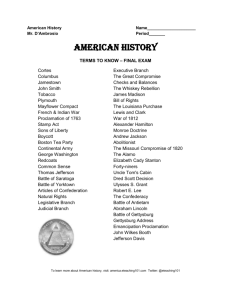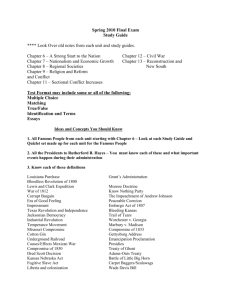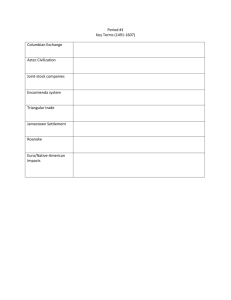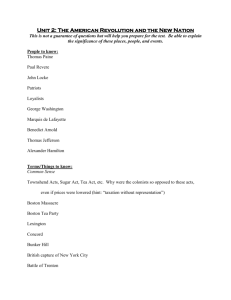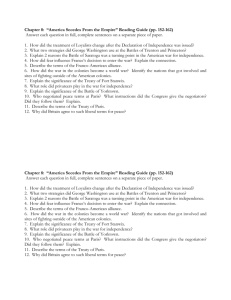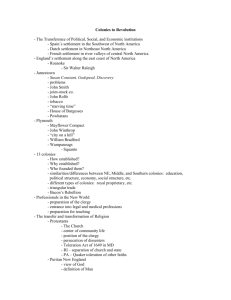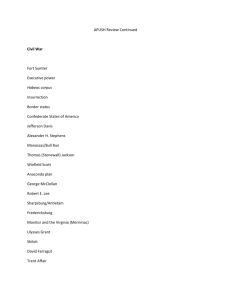Document
advertisement
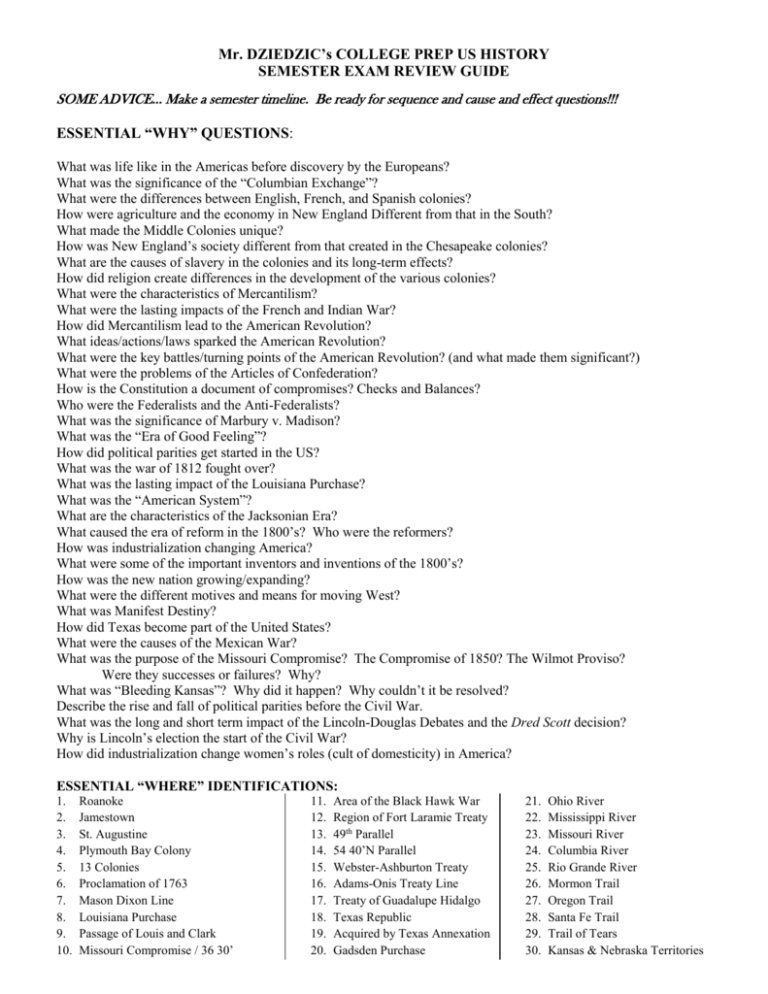
Mr. DZIEDZIC’s COLLEGE PREP US HISTORY SEMESTER EXAM REVIEW GUIDE SOME ADVICE… Make a semester timeline. Be ready for sequence and cause and effect questions!!! ESSENTIAL “WHY” QUESTIONS: What was life like in the Americas before discovery by the Europeans? What was the significance of the “Columbian Exchange”? What were the differences between English, French, and Spanish colonies? How were agriculture and the economy in New England Different from that in the South? What made the Middle Colonies unique? How was New England’s society different from that created in the Chesapeake colonies? What are the causes of slavery in the colonies and its long-term effects? How did religion create differences in the development of the various colonies? What were the characteristics of Mercantilism? What were the lasting impacts of the French and Indian War? How did Mercantilism lead to the American Revolution? What ideas/actions/laws sparked the American Revolution? What were the key battles/turning points of the American Revolution? (and what made them significant?) What were the problems of the Articles of Confederation? How is the Constitution a document of compromises? Checks and Balances? Who were the Federalists and the Anti-Federalists? What was the significance of Marbury v. Madison? What was the “Era of Good Feeling”? How did political parities get started in the US? What was the war of 1812 fought over? What was the lasting impact of the Louisiana Purchase? What was the “American System”? What are the characteristics of the Jacksonian Era? What caused the era of reform in the 1800’s? Who were the reformers? How was industrialization changing America? What were some of the important inventors and inventions of the 1800’s? How was the new nation growing/expanding? What were the different motives and means for moving West? What was Manifest Destiny? How did Texas become part of the United States? What were the causes of the Mexican War? What was the purpose of the Missouri Compromise? The Compromise of 1850? The Wilmot Proviso? Were they successes or failures? Why? What was “Bleeding Kansas”? Why did it happen? Why couldn’t it be resolved? Describe the rise and fall of political parities before the Civil War. What was the long and short term impact of the Lincoln-Douglas Debates and the Dred Scott decision? Why is Lincoln’s election the start of the Civil War? How did industrialization change women’s roles (cult of domesticity) in America? ESSENTIAL “WHERE” IDENTIFICATIONS: 1. 2. 3. 4. 5. 6. 7. 8. 9. 10. Roanoke Jamestown St. Augustine Plymouth Bay Colony 13 Colonies Proclamation of 1763 Mason Dixon Line Louisiana Purchase Passage of Louis and Clark Missouri Compromise / 36 30’ 11. 12. 13. 14. 15. 16. 17. 18. 19. 20. Area of the Black Hawk War Region of Fort Laramie Treaty 49th Parallel 54 40’N Parallel Webster-Ashburton Treaty Adams-Onis Treaty Line Treaty of Guadalupe Hidalgo Texas Republic Acquired by Texas Annexation Gadsden Purchase 21. 22. 23. 24. 25. 26. 27. 28. 29. 30. Ohio River Mississippi River Missouri River Columbia River Rio Grande River Mormon Trail Oregon Trail Santa Fe Trail Trail of Tears Kansas & Nebraska Territories ESSENTIAL “WHO” and “WHAT” IDENTIFICATIONS: 1. 2. 3. 4. 5. 6. 7. 8. 9. 10. 11. 12. 13. 14. 15. 16. 17. 18. 19. 20. 21. 22. 23. 24. 25. 26. 27. 28. 29. 30. 31. 32. 33. 34. 35. 36. 37. 38. 39. 40. 41. 42. 43. 44. 45. 46. 47. 48. 49. 50. Colombian Exchange Pizarro Juan Ponce de Leon Hernan Cortes mestizos Roanoke Jamestown Separatists Puritans Quakers William Penn John Smith John Rolfe John Winthrop Anne Hutchinson Roger Williams Royal Colony Headright System Indentured Servitude Slavery Popé Powhatan Pequot War Metacom Tecumseh Pontiac Black Hawk Little Turtle Sacajawea/Lewis and Clark George Guess Mercantilism Benign Neglect French and Indian War Bacon’s Rebellion Shay’s Rebellion Whiskey Rebellion Stono Rebellion Nat Turner Samuel Adams Edward Braddock Friedrich von Steuben Benedict Arnold Charles Cornwallis George Washington Thomas Jefferson Alexander Hamilton Navigation Acts George Greenville William Pitt Committees of Correspondence 51. 52. 53. 54. 55. 56. 57. 58. 59. 60. 61. 62. 63. 64. 65. 66. 67. 68. 69. 70. 71. 72. 73. 74. 75. 76. 77. 78. 79. 80. 81. 82. 83. 84. 85. 86. 87. 88. 89. 90. 91. 92. 93. 94. 95. 96. 97. 98. 99. 100. Boston Tea Party Intolerable Acts Stamp Act Sugar Act Townshend Act Crispus Attucks/Boston Massacre 1st Continental Congress 2nd Continental Congress Articles of Confederation Checks and Balances Judiciary Act Marbury v. Madison McCulloch v. Maryland Gibbons v. Ogden Commonwealth v. Hunt Federalists/Anti-federalists Era of Good Feelings Edmond Genet Embargo of 1807 War of 1812 Battle for Ft. Necessity Lexington and Concord Battle of Saratoga Battle of Breeds/Bunker Hill Battle of New York Battle of Yorktown Battle of New Orleans Battle of the Alamo Battle of Buena Vista Battle of Mexico City Henry Clay Missouri Compromise James Madison Monroe Doctrine Andrew Jackson John C. Calhoun Indian Removal Act Bank of the US Spoils System Panic of 1837 Enlightenment Egalitarianism Transcendentalism Specialization Utopias Abolition/Emancipation Nullification/Secession Nationalism/Sectionalism 1st Great Awakening 2nd Great Awakening 101. 102. 103. 104. 105. 106. 107. 108. 109. 110. 111. 112. 113. 114. 115. 116. 117. 118. 119. 120. 121. 122. 123. 124. 125. 126. 127. 128. 129. 130. 131. 132. 133. 134. 135. 136. 137. 138. 139. 140. Manifest Destiny James Polk Winfield Scott Sam Houston Zachary Taylor Stephen F. Austin Annexation/Admission Mexican War Daniel Webster Wilmot Proviso Gag Rule Frederick Douglass William Garrison David Walker Sojourner Truth Joseph Smith Brigham Young Horace Mann Dorothea Dix Frederick Douglass American System Market Revolution Putting Out System Samuel Slater/Factory system/Lowell Industrial revolution Specialization Eli Whitney Robert Fulton Cyrus B. McCormick John Deere Daniel Webster Popular Sovereignty Compromise of 1850 John Brown Dred Scot v. Sanford Fugitive Slave Act Bleeding Kansas Abraham Lincoln Stephen Douglas Jefferson Davis 140-149. Bill of Rights 150-159. Top Ten Inventions 160-169 Presidents 1-10 170-179 Presidents 8-16
